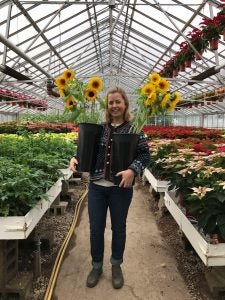Sabrina Bellerose went to the Thompson School of Applied Science at the University of New Hampshire because she wanted to get her hands dirty.
She’s now in the middle of a two-year program in horticultural technology to earn an associate’s degree. She grows flowers, transfers plants, and digs gardens on the Durham, New Hampshire, campus.
“We learn by doing,” Bellerose says. “We’ll get up and go to the greenhouse, study pests and diseases, learn how to apply fertilizer.”
When Bellerose and her fellow horticulture students graduate next year, they’ll be the last of those in the plant-focused program at the Thompson School, part of the university’s College of Life Sciences and Agriculture (COLSA). The school recently announced it would revamp its two-year degree programs and eliminate four areas of concentration: horticultural technology, culinary arts and nutrition, integrated agriculture management, and civil technology.
It’s keeping programs in applied animal science, forest technology and veterinary technology.
“This will ensure UNH continues to provide its students with high-quality academic programs while remaining relevant and responsive to the evolving workforce needs of the state and the rapidly changing face of higher education,” wrote COLSA Dean Jon Wraith in an email response to AGDAILY.com about the Thompson School’s overhaul.
Wraith cited increased competition from other schools offering two-year associate’s degrees and a shrinking number of applicants in the programs being cut. The three remaining programs “best align with the mission of the College of Life Sciences and Agriculture, are more viable, have a direct four-year analog to integrate with and are targeted directly to the state’s primary agricultural sectors,” he wrote.

Bellerose says the loss of the horticulture program will drain a source of skilled, knowledgeable workers who support the state’s industries that grow plants for human and animal consumption, as well as for the benefit of the New Hampshire landscape.
“In the long run, it affects the whole state, because if there’s job openings and there’s no one to fill the jobs, those businesses will close,” she says.
The four programs won’t disappear until after 2019, so Bellerose and other current students will get to finish their intended degrees. But the eventual change concerns Bellerose enough that she launched a petition last month to try to keep the horticulture program.
The petition, which she set up on the social-cause website Care2, had 346 supporters as of Wednesday afternoon. During the recent Thompson School weekend open house and flower show, when the horticulture program sells plants and displays floral designs (and the culinary program supplies treats), Bellerose put out a printed version of the petition that garnered 454 signatures. She also distributed paper versions to post at three Osborne’s Agway Farm & Garden Centers locations. She works at the Winnisquam store.
Candy Marcoux-Dorley, greenhouse manager for Osborne’s Agway and a 1994 graduate of the Thompson School’s horticulture program, signed the petition and calls the plan to drop horticulture “a terrible idea.” She raves about her school experience, learning to identify trees and graft plants — skills she uses today.
“We have to grow food in order to survive,” Marcoux-Dorley says. “We have to sustain our bees in order for the food to grow. We’d just be lost without” the school.
UNH has no intention of halting the changes, Wraith wrote. He provided graphs showing overall enrollment at the Thompson School has dropped from about 425 students in fall 2004 to less than 200 last fall, with the horticulture program slipping from about 60 students to less than 20.

Students interested in plants can take at least 22 courses offered through the four-year agricultural degree programs, Wraith wrote. “The decision was the outcome of a deliberative process, was soberly considered, and is the best approach to ensure a viable Thompson School,” he wrote.
Bellerose says Wraith and other administrators met with students last month to answer questions. She and others lobbed some “harsh” criticism and argued that the school needs better marketing to increase enrollment but received no satisfactory responses, she says.
Bellerose has loved agriculture and plants since childhood, when she participated in FFA and 4-H activities. She plans to spend her career in the soil and isn’t giving up on the place that trained her, she says.
“My goal is to save the horticulture program.”



